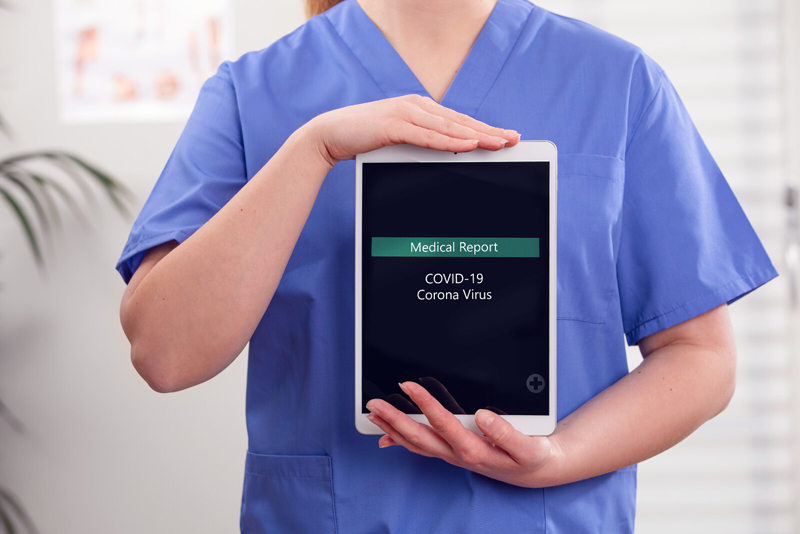
Electronic health records (EHRs) are a reliable source of data for disease symptoms, laboratory results, and treatments, and medical transcription services play a role in ensuring this. However, experts are now mulling over the capabilities of electronic health records (EHRs) to deal with infectious diseases like the current pandemic.
In a recent Stat news report, two researchers from Duke University noted that COVID-19 will be “the ultimate stress test” for EHR systems, with challenges such as evolving workflows, data demands and cyber threats. EHR usability can be improved by planning around these flaws, say Drs Erich Huang, MD, and Eric Perakslis.
- Improve EHR functionality and usability: EHRs are designed to track and bill procedures, rather than provide optimal patient care, say the researchers. An electronic medical record (EMR) has many tabs: the face sheet, history, problems, medications, allergies, visits, notes, lab studies and demographics. Patient data is not available in one place – the provider can get a clear picture of the patient only after clicking on each tab, which usually takes a long time. This is likely to become even burdensome with the influx of COVID-19 patients. Difficulties in assembling a cohesive narrative of the patient’s data can conceal the patient’s susceptibilities and risks for the coronavirus infection. The experts offer the following suggestions to improve EHR functionality and usability:
- Providing a patient-centric construct that allows clinicians to trace back the patient’s signs, symptoms, and diagnostic tests.
- EHR optimization to deal with COVID-19: The experts recommend that increased resources and rapid updating of EHR systems to deal with this new infectious disease. EHR updates must accommodate new symptoms, comorbidities, risk factors, and the relevance of geographic location of COVID-19. Updates the system is crucial to improve clinical productivity and efficiency, improve patient care and reduce clinician burnout. EHR vendor Epic Systems has responded to this requirement with a COVID-19 update for its software. However, EHR are complex and updates are costly, resource consuming and slow, the researchers explained.
- Use specialized mobile apps to support new or evolving EHR systems: This will help streamline patient evaluation, triage, interoperability and other essential functions that EHR workflows cannot handle.
- Improve EHR interoperability capabilities: COVID-19 is also testing EHR interoperability capabilities. During a natural disaster or disease outbreak, it is crucial to be track patients using EHRs. But today’s EHRs are unlikely to have the capabilities to track hundreds to thousands of patients and ensure a proper response to COVID-19. The doctors made the following suggestions to improve information exchange during the COVID-19 pandemic:
- Deploying the application programming interface (API) provision in the ONC interoperability rule
- Ensuring IT staff is up to date with a hierarchy of technology, data, and business priorities
- Ensuring oversight and diligence on all computer IT procedures
- Increasing cybersecurity awareness, preparedness and activities to avoid the possibility of a ransomware outage during an epidemic.
The researchers also recommend adding scribes to enhance clinician efficiency as well as deploying analytic staff for COVID-19 reporting. Medical transcription companies specialized in infectious disease documentation can also help with this.
According to another study published in the Annals of Internal Medicine implementing travel history into the EHR can help put infectious symptoms in context for clinicians (www.ehrintelligence.com).Infectious diseases such as Severe Acute Respiratory Syndrome (SARS) in 2002 and 2003, Middle East Respiratory Syndrome (MERS) in 2012 and 2013 were associated with very specific travel. COVID-19 is also similar. Implementing travel history could prompt warning signs and even protective measures to limit the spread of the disease, say the authors – Trish Perl, MD, chief of infectious diseases and geographic medicine at UT Southwestern Medical Center, and Connie Savor Price, MD, of the University of Colorado School of Medicine.
The suggestions are as follows:
- Implementing travel history as a vital sign, along with temperature, heart rate, respiratory rate, and blood pressure, travel history
- This detailed patient data can encourage further testing, and also help implement protective measures for individuals who come into contact with the patient
- EHRs can also integrate with travel history to customize immediate diagnosis for returning travelers
“We have the infrastructure to do this easily with the electronic medical record, we just need to implement it in a way to make it useful to the care teams. Once the infrastructure is built, we’ll also need to communicate what is called ‘situational awareness’ to ensure that providers know what geographic areas have infections so that they can act accordingly”, said Perl in a news release.
EHR data is very useful for infectious disease surveillance and has been successfully used to track the incidence of Lyme disease, detect newly diagnosed HIV infections, and assess time-based trends in sexually transmitted disease testing as a study published in Curr Infect Dis Rep. in 2019 noted. With the emergence of the novel coronavirus disease, it is imperative that EHR data use in public health surveillance activities continues to increase. Among other things, updating EHR systems to face the new threat is the need of the hour.


